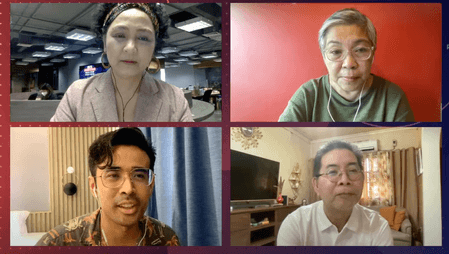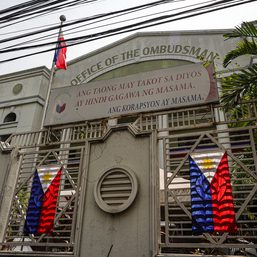SUMMARY
This is AI generated summarization, which may have errors. For context, always refer to the full article.
![[OPINION] A vote for Marcos Jr. is a vote for political dynasties](https://www.rappler.com/tachyon/2022/04/tl-political-dynasty.jpg)
Over 30 years ago, the post-Marcos Martial Law government recognized and addressed the problem of political dynasties. The 1987 Constitution explicitly directed the State to “prohibit political dynasties as may be defined by law.” Although only three or four among the 19 presidential and vice-presidential contenders carry dynastic baggage, they are among the frontrunners. Not surprisingly, the issue has surfaced in the presidential debates.
Senator Pacquiao, hoping to establish his own dynasty, echoed the argument used by dynastic politicians that banning their candidacy violates their individual rights. A dubious argument; the Constitution rejects political dynasties precisely to provide citizens “equal access to opportunities for public service,” rather than preserving them as the quasi-hereditary privilege of a few families. Marcos Jr. and Sara Duterte, the two leading dynastic candidates, shun election debates. We know where they stand.
Counting Sara, the Duterte dynasty has fielded four third-generation descendants: for the senate; the house of representatives; and the post of Davao mayor. In public comments, Marcos Jr. has not ruled out an appointment for his sister, Senator Imee Marcos, to help him run the government. And he is now campaigning for a fourth-generation descendant, his son Sandro, to become governor of Ilocos Norte.
The failure to implement the constitutional mandate on political dynasties has prompted more academic research on the context, causes, and consequences of their proliferation. And they have proliferated. In the elections between 1995-2007, nearly one-third of congressional and one-fourth of gubernatorial winners replaced relatives. Nearly 45% of the 83 congressmen third-termers barred from reelection in 1995 bequeathed the office to successors, who often lacked any prior political track record and credible credentials to win on their own merit. The proper kinship ties ensured victory.
Political dynasties have not only grown in number; they have “fattened.” Dynastic succession has become a pattern. In medieval Europe, the eldest son inherited the family domain; younger sons had to leave and find their fortune elsewhere. In contemporary Philippine politics, although the father’s office could only go to one relative, the family can help elect their kin to other offices within the province or congressional district and beyond, thus fattening the dynasty. Or secure appointments for them in other branches of government. Dynastic families were branching out and entrenching relatives in multiple elective and appointive offices.
By the 15th Congress (2010), an estimated 40% of all provinces in the Philippines had relatives concurrently serving as provincial governor and congressional representative. About 70% of legislators had roots in political dynasties. An estimated 80% of legislators between the ages of 26-40 belonged to political dynasties, signaling the emergence of second and third generation descendants and reflecting the depth of dynastic linkages.
The timely completion of the 2022 University of Virginia dissertation of Dr. Daniel Bruno Davis on “Dynasties and Corruption: How Dynasties Threaten Accountability for Corruption,” sheds light on the persistence and impact of political dynasties. The logical consequences of dynastic dominance already explain their usefulness and the drive to ensure their continuity and fattening. Davis adds quantitative evidence based on a review of the cases tried in the Sandiganbayan until the end of 2019 and the 9.1 million public procurement transactions collected between 2004 and 2019 in the Philippines Government Electronic Procurement System (PhilGEPS).
Mechanisms for horizontal accountability that depend on the ability of government agencies to check each other mainly operate on a “fire alarm” rather than a “police patrol” system. Proactive investigation by dedicated staff to detect corruption is costly; anti-corruption agencies generally respond after people trigger the fire alarm. On the PhilGeps system, Davis discovered that many transactions subject to public bidding closed before the 14-day time-frame during which bids could be submitted, suggesting advantages to those with connections. Many (2/9million cases) did not disclose the winner of the bid. Discontinued or failed bids may legitimately account for the information gap. It may also suggest another corruption; winners may be concealing taxable revenues. But Davis surfaces bigger issues.
Political dynasties weaken systems for horizontal accountability. His study indicates that the chances of prosecution increase as the incidence of corruption rises. But in areas where political dynasties have greater dominance, higher levels of corruption do not translate to more prosecution. Dynasties, individually or in collusion, can mobilize political influence and use or threaten force to conceal or suppress evidence of corruption and, when exposed, to prevent or frustrate their prosecution. As Davies explains, “Dynasties persist by helping to keep their members out of jail.” Gains from corruption, in turn, further reinforces the power of the dynasties to maintain impunity.
Research in other countries (Thailand, Japan, Italy) show advantages that politicians secure from dynastic support to win elections. Analyzing 10 Philippine elections from 1992 to 2019, Davies confirms that fat dynasties enjoy higher chances for electoral victory. Even when dynasts are suspected of corruption, dynastic dominance weakens the vertical accountability that voters exercise by throwing corrupt politicians out of office. To a major extent, this follows from the failure of horizontal accountability; voters will want clear evidence of the suspect’s corruption, difficult to obtain with resistance from dynasts in power.
The political narrative during the Duterte administration has stressed the threats posed by “oligarchs.” What should concern us is the danger of unreformed political dynasties bringing us back to a feudal order. Dynasties now account for 29% of all local positions, estimated as increasing by about 1% a year, and a much higher proportion for national offices. Dynasties, as in the feudal period, also arrange alliances through intermarriage. Voting for Marcos Jr. and Sara Duterte is a vote for political dynasties. Is this the future that we want for our country?
Two hopeful points of light emerge from the Davis research. Voters do reject corrupt politicians when presented with credible evidence. This is the reason why disclosure of the SALN of candidates is critical — and mightily resisted. Second, voters do reject corrupt politicians when there is a clear, clean alternative. – Rappler.com
Edilberto de Jesus is a senior research fellow at the Ateneo School of Government.
Add a comment
How does this make you feel?
![[OPINION] Term limits and the rise of the Duterte dynasty](https://www.rappler.com/tachyon/2021/04/Term-limits.jpg?fit=449%2C449)
![[OPINION] The Marcos dynasty and the battle for Ilocos Norte](https://www.rappler.com/tachyon/2022/03/tl-battle-for-ilocos-norte.png?fit=449%2C449)

![[WATCH] In The Public Square with John Nery: Preloaded elections?](https://www.rappler.com/tachyon/2023/04/In-the-Public-Square-LS-SQ.jpg?resize=257%2C257&crop=414px%2C0px%2C1080px%2C1080px)
![[Newspoint] 19 million reasons](https://www.rappler.com/tachyon/2022/12/Newspoint-19-million-reasons-December-31-2022.jpg?resize=257%2C257&crop=181px%2C0px%2C900px%2C900px)

![[OPINION] The long revolution: Voices from the ground](https://www.rappler.com/tachyon/2022/06/Long-revolution-June-30-2022.jpg?resize=257%2C257&crop=239px%2C0px%2C720px%2C720px)
![[OPINION] I was called a ‘terrorist supporter’ while observing the Philippine elections](https://www.rappler.com/tachyon/2022/06/RT-poster-blurred.jpeg?resize=257%2C257&crop_strategy=attention)
![[WATCH] Bamban POGO scandal: There’s a bigger fish than Alice Guo](https://www.rappler.com/tachyon/2024/07/inside-track-tcard-bamban-pogo.jpg?resize=257%2C257&crop=435px%2C0px%2C1080px%2C1080px)



![[OPINION] What kind of citizens are we?](https://www.rappler.com/tachyon/2024/07/tl-what-kind-of-citizen-are-we.jpg?resize=257%2C257&crop=333px%2C0px%2C1080px%2C1080px)
![[In This Economy] Marcos’ POGO ban is popular, but will it work?](https://www.rappler.com/tachyon/2024/07/thought-leaders-marcos-pogo-ban.jpg?resize=257%2C257&crop=255px%2C0px%2C720px%2C720px)
![[Rappler Investigates] POGOs no-go as Typhoon Carina exits](https://www.rappler.com/tachyon/2024/07/newsletter-graphics-carina-pogo.jpg?resize=257%2C257&crop=424px%2C0px%2C1080px%2C1080px)





![[Hindi ito Marites] First Lady Liza Marcos: Unofficial presidential spokesperson?](https://www.rappler.com/tachyon/2024/05/Hindi-ito-Marites-TC-ls-02.jpg?resize=257%2C257&crop_strategy=attention)


There are no comments yet. Add your comment to start the conversation.